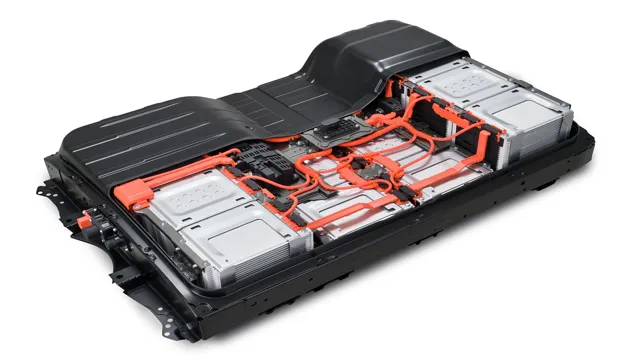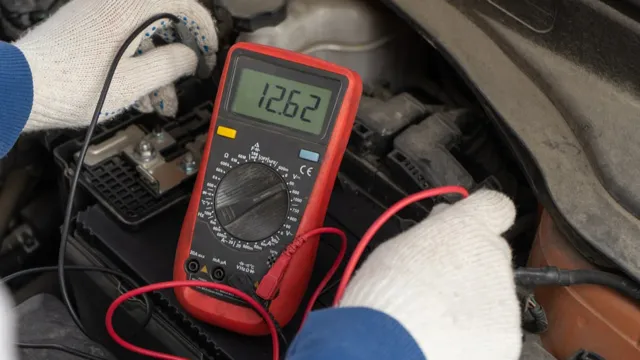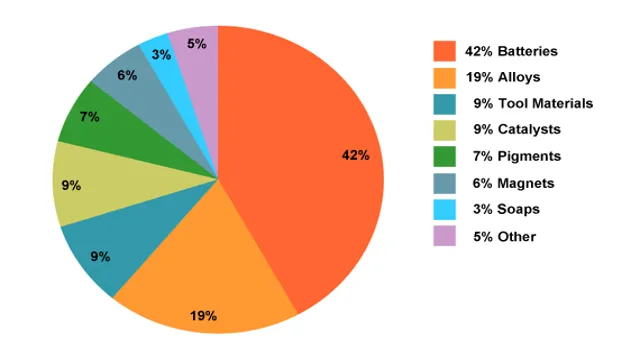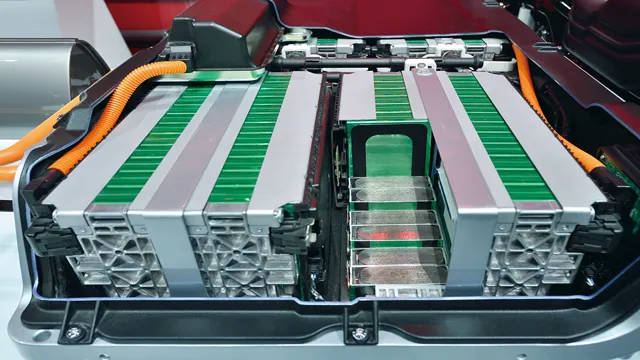Electrify Your Ride: The Science Behind Electric Car Battery Energy Density Explained
Electric vehicles have revolutionized the way we look at transportation. They are environmentally friendly and offer a range of benefits over traditional fossil fuel-powered cars. However, one of the biggest challenges in making electric cars more popular is the battery’s energy density.
Energy density is the amount of energy stored in a unit of volume or weight of the battery. The higher the energy density, the longer the battery can run, and the farther the vehicle can travel without recharging. But how efficient are electric car batteries in terms of energy density, and what advancements have been made in this area? Let’s explore this topic further.
What is Energy Density?
Electric car batteries are a crucial component in the future of sustainable transportation, and a key metric in their design and performance is their energy density. Energy density refers to the amount of energy that can be stored in a given volume or weight of a battery. The higher the energy density, the longer the electric car can travel without needing to be charged.
This is why there is so much research and development being done on improving the energy density of electric car batteries, because a more efficient and longer-lasting battery means a more practical and appealing electric car for consumers. The ultimate goal is to create a battery that is powerful, lightweight, and inexpensive, which will make electric cars accessible and affordable for everyone.
Defining energy density and its importance in EVs
Energy density is an important concept to understand when it comes to electric vehicles (EVs). Simply put, it refers to the amount of energy that can be stored in a certain amount of space or volume. In the case of EVs, this is typically measured in kilowatt-hours (kWh) per kilogram (kg) or liter (L).
The higher the energy density, the more energy that can be stored and the further the vehicle can travel on a single charge. This is why high energy density batteries are critical to the success of EVs, as they allow for longer driving ranges and increased practicality for daily use. Battery manufacturers are constantly striving to improve energy density to make EVs more competitive with traditional gas-powered vehicles, which currently have a higher energy density than most EV batteries.
As technology continues to advance, so too will the energy density of EV batteries, making electric transportation an increasingly viable and sustainable option.
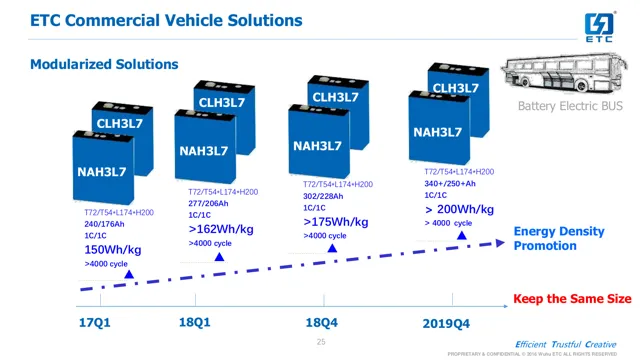
Current State of Electric Car Batteries
In recent years, electric car battery technology has made significant advancements, particularly in terms of energy density. This is an essential factor since it determines how far an electric vehicle can travel on a single charge. Currently, the most advanced battery packs used in electric cars can store around 250Wh/kg, which is more than double the energy density of batteries ten years ago.
However, there is still room for improvement in this area. Researchers are exploring new materials, such as solid-state electrolytes, which could potentially double or even triple energy density. An analogy that might help understand the significance of battery density is thinking of a fuel tank size in a gasoline-powered car.
A bigger tank means more miles per gallon, which is precisely what energy density does for electric cars. The higher the energy density in an electric car battery, the farther it can go on a single charge, making electric cars more practical for everyday use.
Comparing energy density of current EV batteries
When it comes to electric vehicles (EVs), the battery is everything. The current state of EV batteries is constantly evolving and improving. One of the most critical factors in determining an EV’s driving range is its energy density.
Energy density is the amount of energy stored in a battery per unit volume or weight. The higher the energy density, the longer the range of the vehicle before recharging is necessary. Currently, the most popular EV batteries are lithium-ion batteries, which have an energy density of around 100-265 Wh/kg.
However, research is being done to improve this energy density, with some promising developments such as lithium-sulfur batteries and solid-state batteries. With these advancements, the future of EV batteries looks bright, and we can expect even longer driving ranges and faster charging times in the years to come.
Trends in improving energy density and battery technology
The current state of electric car batteries is constantly evolving, with advances in technology leading to improvements in energy density and overall performance. In recent years, manufacturers have been focusing on developing batteries with higher energy density, allowing for longer driving ranges on a single charge. This has been achieved through the use of new materials, such as silicon anodes and solid-state electrolytes, which allow for greater storage of energy.
Additionally, improvements in battery management systems have led to better control and monitoring of the battery’s temperature, charge level, and overall health. As a result, electric vehicles are becoming increasingly viable alternatives to traditional gas-powered cars, with many models now offering ranges of over 300 miles on a single charge. With continued research and development, it’s likely that this trend will continue, leading to even more efficient and capable electric car batteries in the future.
Benefits of High Energy Density Batteries
When it comes to electric car battery energy density, high energy density batteries can offer a variety of benefits. For starters, they can provide longer driving ranges and faster charging times, making them more convenient to use. High energy density batteries can also be lighter and smaller, allowing for easier installation in cars and other devices.
Additionally, they can be more cost-effective in the long run, as they have a longer lifespan and require less maintenance over time. Ultimately, the use of high energy density batteries in electric cars can help to reduce carbon emissions and promote sustainability, making them a great investment for anyone looking to be more environmentally friendly.
Increased driving range and faster charging times
High energy density batteries are becoming increasingly popular due to their benefits of increased driving range and faster charging times. With the ability to store more energy in a smaller space, these batteries allow for electric vehicles to travel longer distances without needing to stop and charge. Additionally, the faster charging times mean that drivers can spend less time waiting for their vehicle to recharge, making electric cars a more convenient option for everyday use.
The benefits of high energy density batteries extend beyond just electric vehicles, as they can also be used for renewable energy storage and other applications that require a reliable and efficient power source. Overall, the increased efficiency and convenience make high energy density batteries a valuable advancement in the field of energy storage technology.
Reduced battery weight and cost implications for EVs
As the electric vehicle (EV) industry continues to boom, battery manufacturers are striving to create more efficient and cost-effective batteries. High energy density batteries have emerged as the solution to reducing battery weight and cost, making EVs more accessible to the masses. With higher energy density, these batteries can provide more power while utilizing less space and materials, resulting in a significant weight reduction.
This translates to improved performance, increased range, and lower costs for manufacturers and consumers alike. Additionally, high energy density batteries have a longer lifespan, reducing the need for frequent replacements and contributing to a more sustainable future. As technology continues to advance, the benefits of high energy density batteries will only continue to grow, making EVs more practical and appealing for the average consumer.
Future of Electric Car Battery Energy Density
Electric car battery energy density is constantly improving as technology advances. In the past, electric cars struggled with short driving ranges and long charging times, but major automakers are now investing heavily in producing batteries with higher energy densities. This means that batteries can store more energy in a smaller space, allowing electric cars to drive further and charge faster.
The goal is to develop batteries with an energy density of 500 watt-hours per kilogram, which is over double the current average. Once this threshold is reached, electric cars will be able to travel over 400 miles on a single charge and charge to 80% capacity in as little as 10 minutes. Not only will this make electric cars more practical and convenient, but it will also lessen the dependency on fossil fuels and their harmful effects on the environment.
With the continuous development of electric car battery energy density, the future of sustainable transportation is looking brighter than ever.
Predictions for energy density advancements in EV batteries
Electric car battery energy density is expected to continue improving in the coming years, making electric vehicles more efficient and attractive to consumers. With advancements in battery technology, there is a growing expectation that the energy density of EV batteries will match or surpass the energy density of traditional combustion engines in the near future. A higher energy density means that EVs will be able to travel longer distances on a single charge and potentially eliminate range anxiety as a concern for consumers.
This improvement will also make EVs more accessible to drivers living in remote areas or without access to charging stations. Overall, the future of electric car battery energy density looks bright, and it will have a significant impact on the popularity and growth of the EV market.
Potential impact on the EV market and transportation industry
As electric vehicles (EVs) continue to gain popularity, the development and improvement of electric car battery energy density will become increasingly important. Essentially, the higher the energy density, the longer and further an EV can travel on a single charge. This could have a huge impact on the EV market and the transportation industry as a whole.
Increased energy density could lead to higher adoption rates, as EVs would become even more practical for daily use. It could also potentially reduce the cost of manufacturing EVs, as automakers could use smaller, lighter batteries while still achieving the same range. Furthermore, if energy density improves enough, it could lead to the creation of new forms of transportation, such as electric planes or long-haul trucks.
As the technology continues to evolve, it will be interesting to see how electric car battery energy density continues to shape the future of transportation.
Conclusion
In conclusion, electric car battery energy density is like the superhero of the automotive world. It’s the hidden power behind the electric car’s ability to soar down the road with speed and efficiency. With each advancement in battery technology, we inch closer to the day when electric cars will become the undisputed champions of the road.
So, if you’re looking to feel like a superhero in your daily commute, consider getting behind the wheel of an electric car with a high energy density battery – because saving the planet has never been so cool!”
FAQs
What is energy density in an electric car battery?
Energy density refers to the amount of energy that can be stored in a given volume or mass. In an electric car battery, energy density is important because it determines how much energy the battery can store and how far the car can travel on a single charge.
How does the energy density of an electric car battery affect its performance?
The energy density of an electric car battery affects its performance by determining how much energy can be stored and how far the car can travel. Higher energy density batteries can provide greater range and performance than lower energy density batteries.
What is the current state of energy density in electric car batteries?
The current state of energy density in electric car batteries is constantly improving. New advancements in battery technology are resulting in higher energy density batteries that can provide greater range and performance.
How does the energy density of electric car batteries compare to traditional gasoline engines?
The energy density of electric car batteries is typically lower than traditional gasoline engines. However, electric car batteries can provide greater efficiency and performance in terms of energy conversion and usage.

